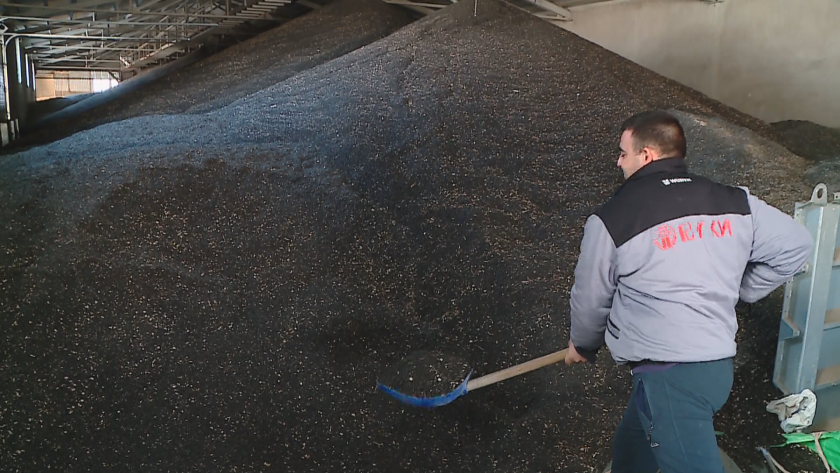
Hundreds of thousands of tonnes of sunflower seeds have entered Bulgaria from Ukraine, at lower prices, Bulgarian producers of the raw material claim. They complain that their warehouses are overflowing and they cannot sell of their produce.
A mountain of sunflower seeds has been sitting in Angel Vukodinov's warehouse in Soyedineniye for months. The 700 tonnes are 90 percent of the yield the farmer harvested from the field.
"The uncontrolled import through the so-called export corridors of Ukrainian grain has led to the point where our warehouses are full of produce and we cannot sell at all or have to sell far below the cost," Angel Vukodinov said.
Concerns of domestic producers are growing because their time to wait for better market conditions is running out.
"If we don't sell this sunflower seeds, how will we get through a successful year until harvest, because there are still a lot of costs to come. I've been in this industry for 32 years and I've never experienced so much uncertainty, so much fear," Vukodinov said.
According to the national association of grain growers, after the opening of the solidarity corridors from Ukraine, as much sunflower seeds as Bulgaria’s annual production of about one million and 300,000 tonnes has entered Bulgaria.
"The big processors brought them in by barge, by ship, by truck. There's footage from a few months ago where queues of Ukrainian lorries are lined up outside our oil mills and outside our storage facilities that's the main problem. At the moment we are jammed and there is no market," said Kostadin Kostadinov, chairman of the management board of the National Association of Grain Producers.
The lack of interest in the commodity was confirmed by the commodity exchange, where there has been neither demand nor supply of sunflower seeds since last year.
"Suddenly, both sellers and buyers have fallen into a latent period, a stagnation. They stopped quoting on the exchange, probably expecting a better price in connection with the problems that are occurring because of the situation in Ukraine," said Alesksandar Davchev, an economic analyst.
The processing industry did not deny that the main quantities of sunflower seeds in warehouses and depots in the country are imported from Ukraine. And the association of grain growers wants urgent measures to prevent Bulgaria from becoming a buffer warehouse.
"Let the corridors reach their destinations, the countries of Africa that are starving," Kostadin Kostadinov urged.
Apart from Bulgaria, the grain market is also experiencing difficulties in Romania, Poland, the Czech Republic and Hungary. Producers from these countries are issuing a joint declaration to the Council of Ministers of the European Union and demanding urgent measures to curb the glut on the market, which is driving prices down. Contracts on the European commodity exchanges confirm the downward trend, because every month the price of sunflower seeds is lower by EUR 5 per tonne.
 Министър Околийски за Националната детска болница: Звучи като "Белене" в здравеопазването, някакви хора имат интерес да протакат процеса до безкрай
Министър Околийски за Националната детска болница: Звучи като "Белене" в здравеопазването, някакви хора имат интерес да протакат процеса до безкрай
 "Сирени вият ден и нощ, не можем да се приберем": Разказ от първо лице на блокирани в Близкия изток българи
"Сирени вият ден и нощ, не можем да се приберем": Разказ от първо лице на блокирани в Близкия изток българи